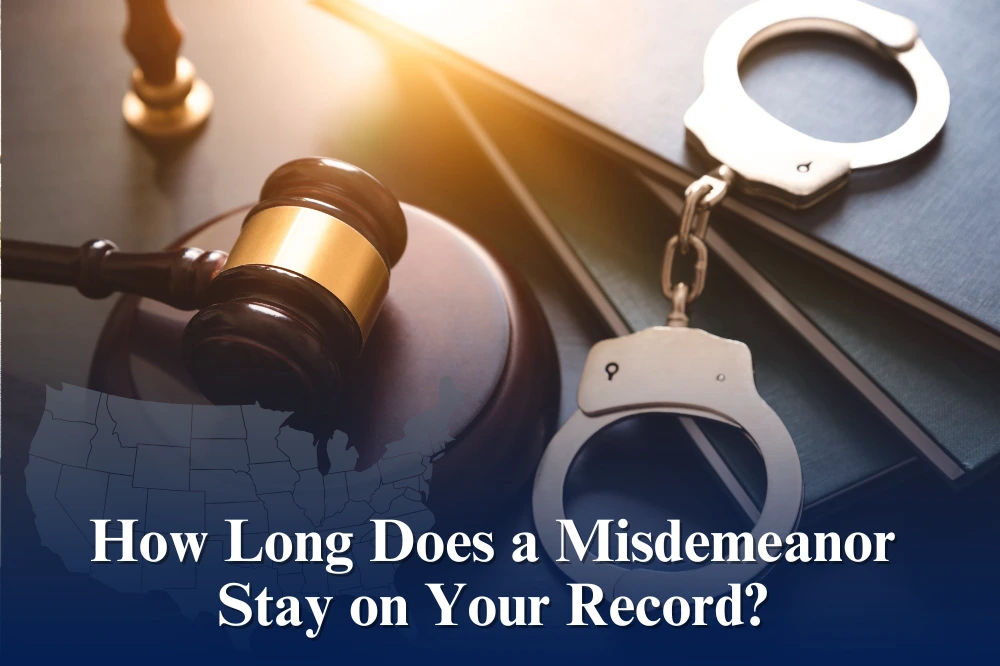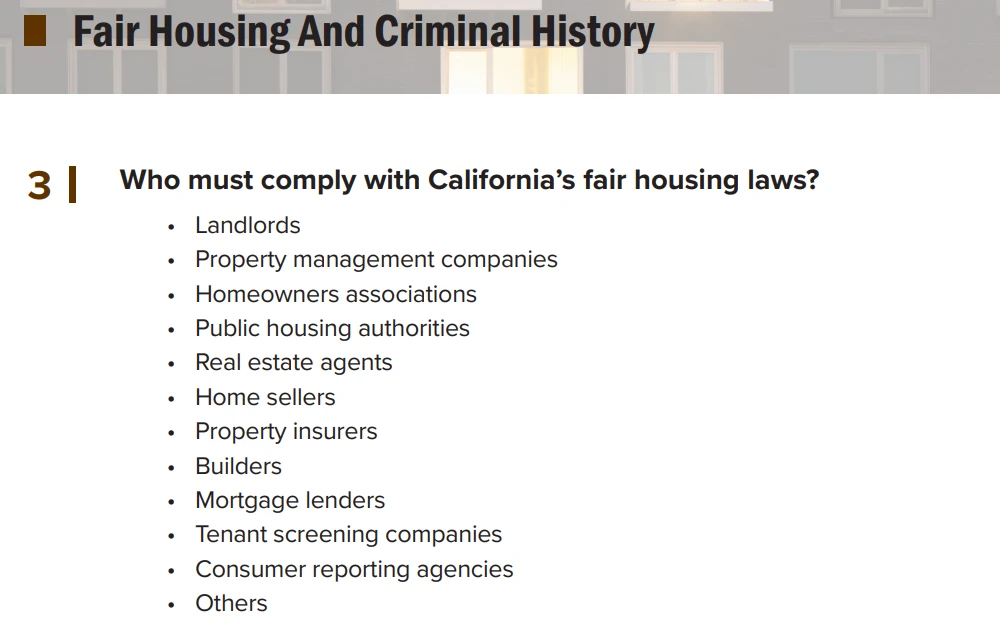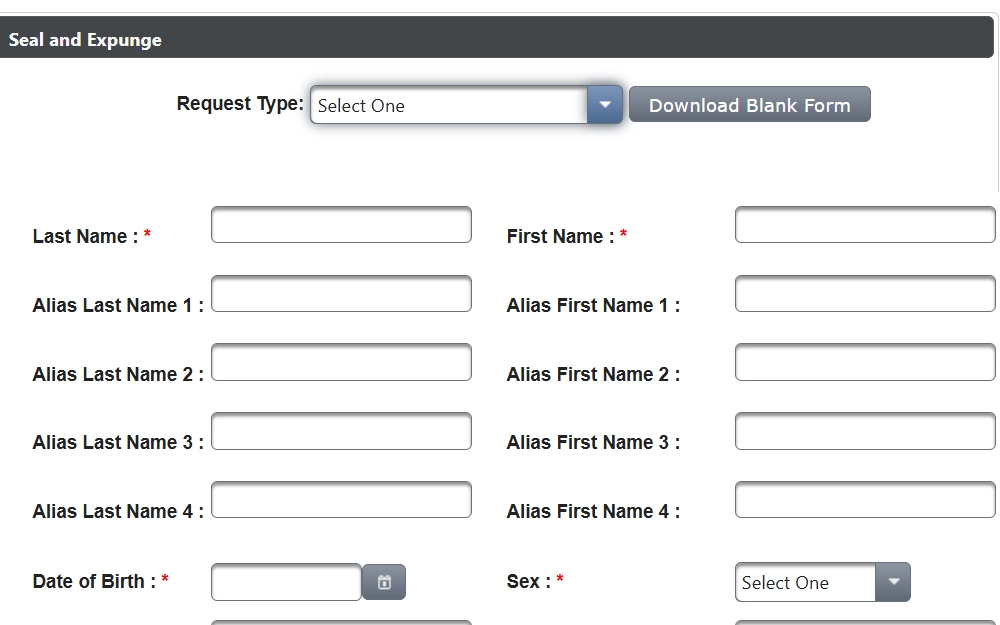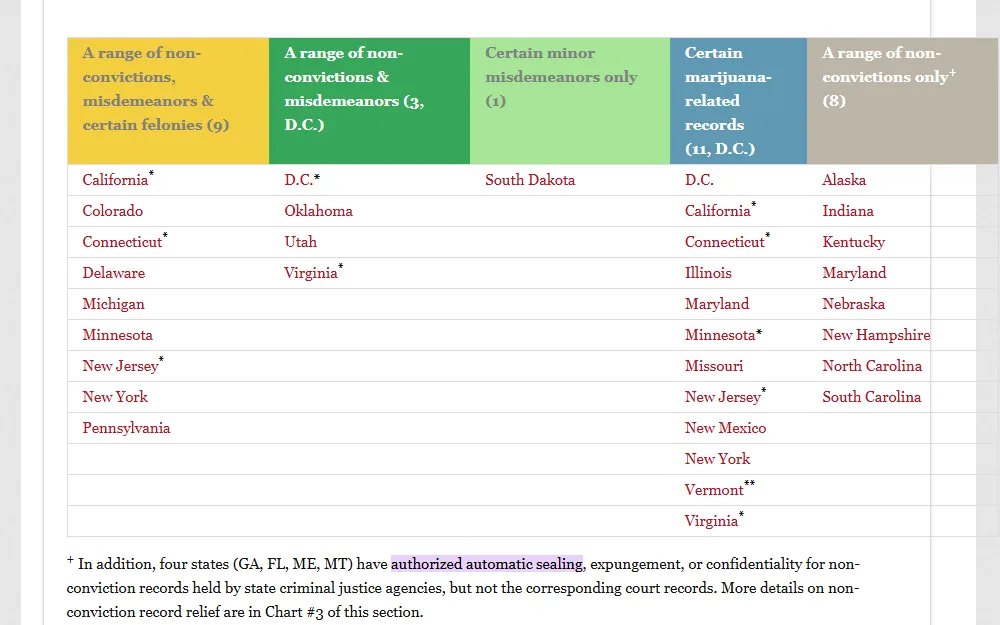
Understanding how long a misdemeanor stays on your record is crucial, particularly if you’re seeking a fresh start after serving your sentence or paying a fine.
An offender can be charged with a misdemeanor or felony based on the nature of crime. Misdemeanors typically have fewer penalties and come with shorter prison sentences than felonies. To be more specific, a misdemeanor is a crime which is generally punishable by probation, fines or with less than 12 months in jail, while a felony brings a longer prison term.
This article informs the public about the consequences, impacts, and factors that affect the duration of a misdemeanor on a person’s record, as well as how to reduce that time and make positive changes for your future.
Factors Influencing How Long Misdemeanors Stay on Your Record
If you are charged with a misdemeanor offense and have already served your punishment, it is quite troubling how long this may remain on your record.1
There are various key factors that may affect its duration. The length of time a misdemeanor charge remains on your criminal record may vary based on the nature and severity of offense committed, the state specific laws, prior criminal history and other legal circumstances.
Each state maintains its own laws regarding the duration of misdemeanor offenses that stay on your record. In California, particularly in San Diego County, such records are allowed to be expunged after one year, while others keep these records visible for significantly longer periods.2
Another factor is the type of misdemeanor that the individual is charged with. Misdemeanors fall into different classes or levels; the more serious the offense the longer it will stay on your record.
For those who committed an offense for the first time that falls under non-violent offenses, misdemeanor convictions often have shorter retention periods and have a high chance of getting expunged. Some examples of this are drug possession, minor theft, and disorderly conduct.
Violent misdemeanors, even if minor, usually remain on records longer and face stricter expungement requirements. Domestic violence charges, particularly, often have extended retention periods regardless of jurisdiction.
However, some states do not classify misdemeanor by categories; in such cases, punishments are given based on crime-by-crime basis.
Other than the previously mentioned factors, misdemeanors remain visible in individual records depending on prior criminal history – meaning that if you’ve already been charged with a crime and have now committed another, this may lead to the extension of this record to remain active.
The offender’s age at the time of the offense also has an impact on its duration. Juvenile misdemeanors often have different rules, with many jurisdictions providing more lenient options for sealing or expunging youth records.
Negative Consequences of Misdemeanors on Your Criminal Record
Although misdemeanor convictions are less severe than a felony, any individual convicted of a crime faces negative consequences that may impact various aspects of his life.
Misdemeanor convictions can create obstacles when applying for a job, seeking housing and credit application and even when pursuing educational opportunities. These consequences often extend far beyond the original punishment and can persist for years even after completing the sentence or penalty set by the court.
Impact of Misdemeanors on Employment Opportunities
Having a misdemeanor on your record can significantly complicate your job search. A criminal record, even if minor, can result in immediate rejection during employment screenings, as companies routinely include background checks in their hiring procedures.
Companies with strict regulatory requirements —in fields like healthcare, finance and education— may be particularly hesitant to hire individuals with criminal records.
Additionally, professional licensing boards often want to know about your record, and some convictions – even if they fall under misdemeanor offense – might block career paths.
There are two ways to try to get these records hinder your job applications: sealing and expungement. Sealing your record keeps it under wraps from most employers, though some government agencies can still peek. Expungement goes further, wiping the slate clean legally speaking.
Each state has different rules, so what works in Texas might not be the same in California.3
In the United States, most jurisdictions have ban-the-box laws, which push criminal history to be questioned later in hiring to avoid upfront bias against those with criminal pasts. Additionally, the Equal Employment Opportunity Commission (EEOC) says employers must look at each case individually.
How Misdemeanors Affect Housing Applications & Credit
Searching for a home while marked with a misdemeanor record can be a daunting task, especially when navigating housing applications and credit checks.
Many landlords and property management companies perform background checks on potential tenants, and even a minor criminal record, including those misdemeanor convictions, may result in denial of housing application.
While misdemeanors can reduce the likelihood housing approval, there are laws that provide specific protections against this unfair discrimination for those individuals that have a record. For example, in California, the state fair housing laws mandate individual assessment of each application, requiring landlords to consider rehabilitation evidence and provide clear justification for any denial.

Landlords must evaluate multiple factors including time since conviction, nature of the offense, current circumstances, rental history, and income stability rather than making blanket rejections.
Additionally, California residents can seek support from the Department of Fair Employment & Housing. The National Housing Law Project also provides extensive legal resources and tenant rights information.
Expungement or Sealing: Your Options & How To Pursue Them
If you want to get a fresh start in life, sometimes it means addressing your past legal issues. As previously mentioned, having a misdemeanor record under your name has a significant impact that may build boundaries and limitations.
In most jurisdictions, any person carrying misdemeanors has the option to potentially expunge or seal their records. Although there are some similarities between the two, these options offer different levels of records clearance.
Expungement is the deletion of arrest and criminal records, and leaving only those confidential copies. These confidential copies are essentially not accessible by the public and, in some cases, are even hidden from law enforcement agencies or courts.
Alternatively, sealing your record makes it confidential; the records still exist but are only hidden from most background checks. However, note that certain government agencies and specific employers can still view these records.
Either of these options can be helpful if you desire to shorten the time misdemeanor convictions be shown in your record. If your record is already expunged or sealed you can deny the arrest and restore certain rights, giving you more options for employment, making housing applications easier and ensuring you to have peace of mind.
However, you may need to disclose your record in various cases like applying for a license, running for election or public office and seeking employment with justice agencies.
How To Petition for Expungement or Sealing of a Misdemeanor
If you are ready to petition for expungement or sealing of a misdemeanor record, it’s important to first understand how the process works.
Those seeking to erase misdemeanor records must submit their request directly to the courthouse where their original prosecution occurred. It’s worth noting that each criminal matter requires its own separate filing – there’s no option to bundle multiple cases into a single request.
Meeting expungement criteria typically requires: a waiting period after case completion, a clean record since then, no major felony convictions, limited prior offenses, and full completion of any court-ordered requirements like probation or parole.
For instance, if you are residing in Florida, expungement and sealing of records starts with reaching out to the Florida Department of Law Enforcement (FDLE) and applying for a Certificate of Eligibility; this is to make sure that you’re an eligible candidate.5
However, the issuance of this certificate does not certify that the misdemeanor record will be expunged or sealed, as this will be based on the sole discretion of the court.
To apply for the certificate of eligibility, you can either download the application form, or send an email to FDLE Expunge Section at [email protected] and request for the certificate to be emailed back to you.

There are several types of relief available in Florida. To gain better understanding, visit the Florida sealing and expungement page.7
Once the application is submitted, you may possibly wait for about 12 weeks to get your record sealed.
The process of filing a petition varies depending on the state laws, so it is important to contact the relevant agency or consult the legal professional, and ask for guidance.
Can Misdemeanors Be Automatically Sealed After a Certain Amount of Time?
Contrary to common belief, misdemeanor records in most states are not automatically sealed or expunged after a specific time period. While some states have implemented automatic sealing processes, the majority require individuals to file petitions to have their records sealed.
Currently, states like California, Michigan, New Jersey, and Utah have automatic sealing programs for eligible misdemeanors, with waiting periods ranging from 4-10 years after case completion.

Most jurisdictions maintain a petition-based system where individuals must actively request record sealing, typically waiting 3-10 years depending on the offense type and meeting specific eligibility criteria such as having no subsequent charges and completing all sentence requirements.
Four states, being Georgia, Florida, Maine, and Montana have authorized automatic sealing or confidentiality specifically for non-conviction records held by state criminal justice agencies, though court records may remain public. The misconception that U.S. criminal records automatically clear after 7 years persists, but in reality, sealing requirements vary significantly by jurisdiction.
Many individuals face challenges navigating the petition process without legal assistance, as requirements can be complex and vary by state.
As criminal justice reform continues, more states are considering legislation to expand automatic sealing provisions, though current laws remain largely petition-based.
What Happens if You Don’t Expunge or Seal Your Misdemeanor?
Having a misdemeanor record can create long term consequences. If you leave your records unsealed or unexpunged this will remain visible to the public and can build limitations especially to employment, health care opportunities, education and more.
Since most companies often do background checks, these checks may reveal the offense to employers. Other than employment, once the landlords notice that you have a misdemeanor record they may reject your housing application. Travel plans could also face complications and some volunteer opportunities might be limited.
When considering how long a misdemeanor stays on your record, it’s important to know that these offenses remain permanently on your record unless expunged or sealed, and the specific timeframes vary by state and from the nature of the offense committed.
References
1Cornell Law School. (2025). misdemeanor. Legal Information Institute. Retrieved January 2, 2025, from <https://www.law.cornell.edu/wex/misdemeanor>
2San Diego County Office of the Public Defender. (2025). Expungement (Dismissal) of Criminal Records FAQ. Retrieved January 2, 2025, from <https://www.sandiegocounty.gov/content/sdc/public_defender/expungement_faq.html>
3Collateral Consequences Resource Center. (2025). 50-State Comparison: Limits on Use of Criminal Record in Employment, Licensing & Housing. Restoration of Rights Project. Retrieved January 2, 2025, from <https://ccresourcecenter.org/state-restoration-profiles/50-state-comparisoncomparison-of-criminal-records-in-licensing-and-employment/>
4California Civil Rights Department. (2022, November). Fair Housing And Criminal History FAQ. Retrieved January 2, 2025, from <https://calcivilrights.ca.gov/wp-content/uploads/sites/32/2020/04/Fair-Housing-and-Criminal-History-FAQ_ENG.pdf>
5Florida Department of Law Enforcement. (2025). Contact Seal and Expunge. Retrieved January 2, 2025, from <https://www.fdle.state.fl.us/Seal-and-Expunge-Process/Contact-Us>
6Florida Department of Law Enforcement. (2025). Seal and Expunge. Retrieved January 2, 2025, from <https://web.fdle.state.fl.us/intakeweb/formrenderer.xhtml?pageId=se>
7Florida Department of Law Enforcement. (2025). Seal and Expunge Process. Retrieved January 2, 2025, from <https://www.fdle.state.fl.us/seal-and-expunge-process/seal-and-expunge-home.aspx>
8Collateral Consequences Resource Center. (2025). Automatic record clearing – convictions. Restoration of Rights Project. Retrieved January 2, 2025, from <https://ccresourcecenter.org/state-restoration-profiles/50-state-comparisonjudicial-expungement-sealing-and-set-aside-2-2/#:~:text=ME%2C%20MT)%20have-,authorized%20automatic%20sealing,-%2C%20expungement%2C%20or%20confidentiality>
